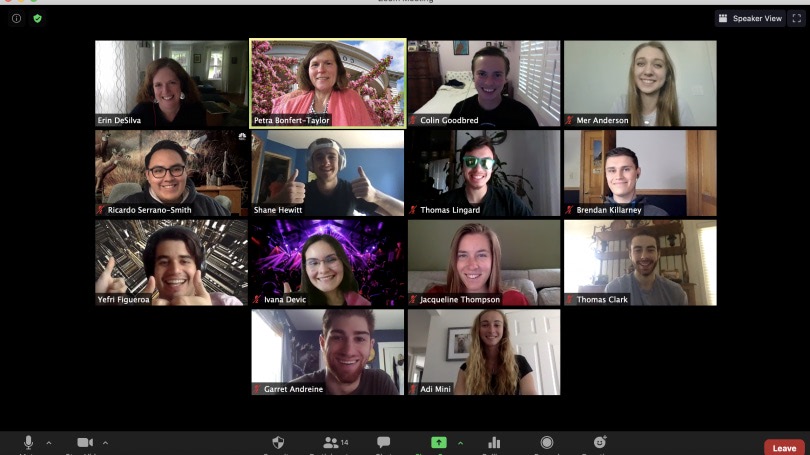- Undergraduate
Bachelor's Degrees
Bachelor of ArtsBachelor of EngineeringDual-Degree ProgramUndergraduate AdmissionsUndergraduate Experience
- Graduate
Graduate Experience
- Research
- Entrepreneurship
- Community
- About
-
Search
All Thayer News
Learning Fellows See Both Sides of Remote Classes
Jun 25, 2020 | by Hannah Silverstein
In virtual classrooms, learning fellows have a unique perspective on remote learning.

A weekly Zoom "huddle" with Professor Petra Bonfert-Taylor's "ENGS 20" learning fellows and Erin DeSilva, assistant director of Learning Design and Technology. (Photo courtesy of Petra Bonfert-Taylor)
In a normal "Engineering Sciences 20: Introduction to Scientific Computing" class session during a normal term, "ENGS 20" head learning fellow Mer Anderson '21 would spend much of her time circulating around the lecture hall, encouraging pairs of students as they solved coding problems posed by Professor of Engineering Petra Bonfert-Taylor.
A computer and mechanical engineering major, Anderson first learned to code in just such a class, an engineering prerequisite. "The way coding works is the way my brain works," she says.
She liked it so much that she applied to become a learning fellow—one of the 47 undergraduates hired as "near-peer mentors" for students in classes across the institution. That experience "made me realize that eventually I want to be a professor," she says.
Of course, this spring has been anything but normal, thanks to the COVID-19 pandemic, which has forced all Dartmouth courses to follow a remote teaching and learning model. And the Learning Fellows Program—a joint initiative of Learning Design and Technology and the Dartmouth Center for the Advancement of Learning (DCAL), now in its fifth year of helping faculty extend opportunities for active learning in the classroom—has had to adapt quickly to the new reality.
Breakout Rooms and Icebreakers
Now Bonfert-Taylor has organized the virtual version of "ENGS 20" around Zoom's breakout-room feature, which allows assigned groups of about four students to collaborate. Learning fellows, who use Slack channels to communicate with each other and Bonfert-Taylor outside of Zoom, are assigned to work with each group.
The changes took intensive planning, and the course has continued to evolve throughout the term. "We meet every week with the learning fellows to brainstorm new ways of engaging students, " Bonfert-Taylor says. "After the first week, students weren't really talking to each other in the breakout rooms, so the learning fellows had the idea to do icebreaker activities."
Among the activities: Groups have had to find three things each member has in common, or find out the most interesting thing they each learned that week outside of class.
"I'm the biggest proponent of silly icebreaker games," Anderson says. "We have to be intentional about creating connections, because we've lost the more natural way of creating them. One of the things that the learning fellows have been trying to do is to make class worth coming to."
Link to source:
https://news.dartmouth.edu/news/2020/06/learning-fellows-see-both-sides-remote-classes
For contacts and other media information visit our Media Resources page.
